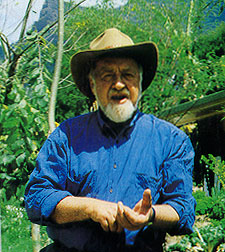

![]()
"To empower the powerless and create a 'million villages' to replace nation-states is the only safe future
for the preservation of the biosphere. Let interdependence and personal responsibility be our aims."
---Bill Mollison, Permaculture: A Designer's Manual
Bill Mollison, an Australian jack-of-all-trades, developed an agricultural systems strategy after extensive research
on the Tasmanian aborigines. He and David Holmgren coined the phrase permaculture (permanent agriculture), while
attempting to create an "interdisciplinary earth science with a potential for positivistic, integrated, and
global outreach" (Mollison ix). The agricultural system that he developed involves a comprehensive paradigm
shift that includes the development of an ethical and moral approach to the natural world. The foundation of this
ethics begins with the adoption of a "sophisticated aboriginal belief system." By looking towards the
aborigines, we can develop a more holistic approach to the world around us. Mollison summarizes this belief in
his book Permaculture: A Designer's Manual:
"Life (according the aboriginal people of Australia) is a totality neither created nor destroyed. It can be
imagined as an egg from which all tribes (life forms) issue and to which all return. The ideal way in which to
spend one's time is in the perfection of the expression of life, to lead the most evolved life possible, and to
assist in and celebrate the existence of life forms other than humans, for all come from the same egg" (2).
With this belief system, which is inherent to Mollison's form of permaculture, the "prime directive of permaculture"
can be met. This directive is acceptance of responsibility for our own existence and that our offspring (1).
Mollison's vision reaches into the world of politics and economics, providing a comprehensive solution to the environmental
crisis that is threatening our biosphere.

The above image is from the cover of Mollison's book.
It represents the egg of life that Mollison discusses ---
"the quantity of life that can't be created or destroyed" (Mollison xi).